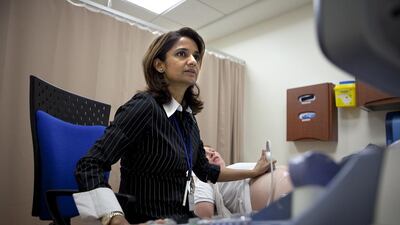Doctors have expressed concern yet again about the rising number of caesarean sections being performed in this country. Despite the risks associated with the procedure (it is, after all, a major operation), statistics show that more and more women are choosing to go under the knife. As The National reported yesterday, citing the World Health Organisation, one in four births this year were c-sections. These are higher than the 10 to 15 per cent recommended by the WHO.
Why are all these women making such a risky choice? The reasons aren’t properly documented as yet but experts say there could be many factors: having babies later in life; the culture of having large families and the misconception that surgery may be less painful than natural childbirth. There is not a lot that can be easily – or quickly – done about women leaving it very late to have children. This is driven by complex social factors. But it’s certainly possible to tackle people’s misconceptions about natural birth versus c-sections. Doctors and midwives are best placed to do this. They are the first point of contact for expectant mothers and are responsible for answering questions, quelling fears and taking them through various scenarios.
It is important that women fully understand the consequences of having a c-section. These include a longer recovery period than if they had given birth normally, with all the resulting implications for childcare and household management; infection; adhesions that can impair bowel function and fertility and life-threatening blood clots. All of this should be explained clearly from early on in the pregnancy so that women don’t see a caesarean as a choice but only as a necessity in the event of a sound medical reason.
There is another, darker reason that more c-sections are being performed. These can be big earners for hospitals so there is little incentive for unscrupulous health care providers to discourage women from opting for an operation rather as she would a handbag or a yoga class. This is why it’s important that the health authorities help raise awareness about the issue.
Giving birth can be a traumatic experience and rather than judge women for the choices they make, it would be better to help them arrive at informed decisions.

